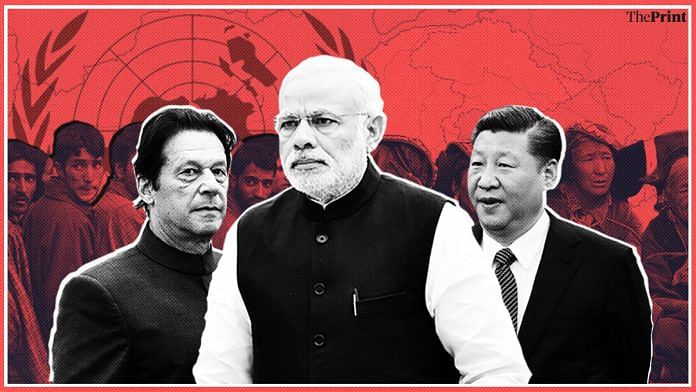The UN Security Council will discuss the Kashmir issue after China called for a closed-door meeting. Pakistan had written to Poland protesting India’s decision to abrogate Article 370 of its Constitution. Earlier, France had responded to Pakistan’s request, suggesting that a discussion be held in a ‘less formal manner’.
ThePrint asks: Should India worry about China and Pakistan pushing the UNSC on Kashmir?
UNSC likely to ask India & Pakistan to resolve Kashmir conflict bilaterally & not issue new resolution
 Talmiz Ahmed
Talmiz Ahmed
Former Indian Ambassador to Saudi Arabia, UAE & Oman
This is not something India should worry about — it is a closed-door meeting of the United Nations Security Council (UNSC). China’s first reaction after the abrogation of Article 370 was to ask India and Pakistan to exercise restraint. Poland’s foreign minister Jacek Czaputowicz too has said the Kashmir issue should be resolved bilaterally between India and Pakistan.
Pakistan has mainly used the UNSC resolution on Kashmir to serve its domestic interests, and the international community has been fully aware of it. Pakistan enjoys no credibility in the international community; it is known for using violence as a tool to further its gains.
In the context of the 1972 Simla Agreement and the 1999 Lahore Declaration, India and Pakistan made a commitment to discuss and resolve their differences bilaterally. This mutual understanding leaves no scope for any third-party involvement. Both these agreements clearly maintain that issues between the two countries must be dealt with through peaceful means. And the reason why India and Pakistan have not improved their relations is because the latter has not stopped using violence.
The two documents supersede everything that happened during 1948-49. The UN is quite disinterested in raking up its old documents on the Kashmir issue. The international body is likely to ask the two countries to resolve the Kashmir issue bilaterally. In any case, no resolution will likely come from the closed-door meeting because the UNSC’s permanent members will veto it.
Also read: UNSC closed-door meeting on J&K not expected to amount to much for India
India should make efforts to prevent UNSC from issuing any statements after the meeting
 Kanwal Sibal
Kanwal Sibal
Executive council member, VIF, and former foreign secretary
China has again demonstrated to what extent it is willing to support Pakistan. China’s move is an act of provocation that will help Pakistan bring international attention to the Kashmir issue. Pakistan can then raise confrontation levels with India and instigate separatists in the Valley.
After 1965, this is the first time that the Kashmir issue has been inscribed on the UNSC agenda. When Pakistan integrated the autonomous territory of Gilgit-Baltistan in 2009, the UNSC did not discuss the step. With China-Pakistan Economic Corridor (CPEC) projects in the region, China has already violated the UN resolutions on Kashmir.
India should use its diplomatic resources to prevent the UNSC from issuing any statement after the closed-door meeting. India’s best bet would be to hope that at least one or all the other four permanent members veto anything tabled during the meeting. India could count on France, especially since PM Narendra Modi is expected to visit the country in less than two weeks from now.
India need not worry about China and Pakistan’s moves as it is capable of defending its national interest. What is important is that India needs to diplomatically retaliate against China. This can be done by either inviting a Taiwanese minister officially or asking Dalai Lama to speak in New Delhi about Tibet and that should be attended by a minister.
Also read: India committed to No First Use nuke policy, but ‘future depends on circumstances’: Rajnath
World has rejected India’s plea to treat J&K as its internal matter. This should worry Modi govt
 Salman Bashir
Salman Bashir
Former foreign secretary of Pakistan, and former high commissioner of Pakistan to India
India and Pakistan’s diplomatic brawl over Kashmir has been before the UN for more than half a century now. The fact that the Security Council has taken up this issue in the wake of distress in Kashmir reflects the nature of this dispute, and this has put international peace and security at risk.
India’s plea to the international community to treat the Kashmir issue as an internal matter stands rejected. So yes, India should worry about its global standing in the world.
Unilateral actions and a brutal crackdown on Kashmiris have turned out to be costly and are likely to be prohibitive.
This will have implications for India’s Narendra Modi-led government. PM Modi speaks of ‘one nation, one constitution’, but is India one nation or an assemblage of nations? And is it fair to impose the ideology of Hindutva in a multi-faith, multi-ethnic and multi-cultural country like India? Hype and hyper-nationalism can only get one so far.
Pakistan sees the Kashmir issue in terms of the fundamental rights of the Kashmiris. This is in line with what the UNSC decreed more than fifty years ago. Kashmiris will continue their struggle for the restitution of their basic rights irrespective of the outcome of the UNSC meeting. We have no illusions about the limitations of the UN’s efficacy.
India can take some comfort here, but in the larger historical context, the Modi government has initiated a process that will likely endanger prospects of peace, harmony and prosperity in South Asia.
China and Pakistan’s move at the UNSC is just a little nudge to alert the international community about what might unfold next —dark clouds and thunder.
J&K is India’s internal matter. And China knows better than to seriously heed Pakistan’s request
 Zorawar Daulet Singh
Zorawar Daulet Singh
Author of Power & Diplomacy: India’s Foreign Policies During the Cold War, and Fellow at the Centre for Policy Research
China has been taken aback by India’s decision to strengthen its sovereign authority over Jammu and Kashmir after Pakistan waged a prolonged proxy war against us. However, Beijing will be cautious for several reasons. First, the balance of power is in India’s favour. Any unfriendly move by China will be stymied by Russia and probably by other permanent members as well. None of them wants to jeopardise their ties with India.
Second, since 2018, India and China have proactively stabilised their relationship, and Beijing would not like to disrupt this engagement especially when it is already facing other challenges. Third, India has reassured the international community that the re-organisation of J&K is an internal matter, it will have no bearing on regional and international stability or the territorial status quo in the subcontinent.
It would be ironical and dangerous for Beijing to seriously entertain Pakistan’s petition that legitimises the idea of interference in another country’s internal affairs. In short, China can do little more than just provide token diplomatic support to Pakistan.
No one has the appetite for another international confrontation – not UN, not US, not even China
 Lalit Mansingh
Lalit Mansingh
Former Indian ambassador to US
The international community’s response to the abrogation of Article 370 has been muted because it realises that the issue is India’s internal matter and the move complies with our legal and constitutional framework. The two exceptions are China and Pakistan. Pakistan suspended trade with India, while China took a more nuanced stance on the issue — while still supporting Pakistan.
Until now, no Muslim-majority country has supported Pakistan because there’s a realisation that the Kashmir issue is only between India and Pakistan. The entire situation has been handled fairly well by Indian diplomats. There is also a fair bit of UN fatigue on this matter. The issue was discussed in the UN but never reached a solution. And now even the UN is prepared to disassociate itself from the issue because it realises that Kashmir is a bilateral concern between India and Pakistan.
Moreover, other countries have their own set of problems. The US is too busy with its trade war with China and withdrawing troops from Afghanistan. China is also struggling with the Hong Kong protests, which is more urgent than Kashmir. In West Asia, the situations in Yemen and Syria is also bleak. In short, no one has the appetite for another international confrontation.
India is happy to consider bilateral talks only if Pakistan stops sponsoring cross-border terrorism.
If China wanted to seriously embarrass India, it would have asked for an open meeting at the UNSC instead
 Jyoti Malhotra
Jyoti Malhotra
National & Strategic Affairs Editor, ThePrint
The closed-door consultations at the UNSC on Kashmir is the closest India has come to witnessing an internationalisation of the Kashmir issue since the 1999 Kargil conflict.
But India should hold its nerve. There is enough evidence to show that China is mounting this pressure only on behalf of its ‘client state’ Pakistan, and might be willing to arrive at a compromise with India for several reasons.
First, China is hardly in a position to throw stones at another country when it lives in a Tibet-Xinjiang glasshouse riddled with human rights violations. Second, Chinese President Xi Jinping is visiting India in October and would not like to up the ante with its host nation just a few weeks before.
Third, China owes Pakistan for allowing it to build an economic corridor and giving it a key foothold in South Asia. One should notice that China asked for a closed-door meeting — if it wanted to embarrass India seriously — it would have asked for an open meeting at the UNSC.
Certainly, India is a far more powerful nation today than it was at the time the Kargil conflict broke out. The world will be willing to give it a much longer rope, especially as it sees Pakistan as the epicentre of terrorism.
This is why India must address the crisis within at the earliest. The announcement by authorities in Srinagar Friday afternoon that schools will be soon opened and the gag on media and phone lines lifted will go a long way in telling the world that India has things under control in Jammu and Kashmir.
By Revathi Krishnan and Taran Deol




Sometimes people say many things without saying anything.
That was Sardar Swaran Singh’s forte as Foreign Minister. He could bore his interlocutors to sleep. Priceless when discussing Kashmir.
Pakistan and the Western Media has been bloodied at the UN
Pakistan got a bloody nose and with it, its friend China got snubbed. Not only that liberal Indian media, which since last 20 to 30 years has operated in cahoots with the British Liberal and Conservative media exposed itself into the open. The Kashmir dispute at the closed door Security Council meeting stated, is a bilateral issue, should be discussed mutually. Now what is left for Pakistan to do – initially they misinformed their public that Pakistan has won a great victory, then gradually over two days has begun to sulk and switch to other issues like India’s no first use nuclear weapon policy review. Imran Khan and his advisors with loud voices were proclaiming that India will be forced to retreat from its Article 370 abrogation. No, sir, nobody sided with Imran Khan except he’s all talk, so is his foreign minister. Now the matter is back to square one. India has abrogated the special status for Kashmir, the whole world knows about it and none sided with Pakistan. The latter is demanding talks, which could take place any day as soon as Pakistan takes back its terrorists from Kashmir. If they don’t, then these fools will undertake a bad act or two and invitation to war is already made. ……. What a fools paradise.
The bloody nose has also been given to Lutyenites media in Delhi and their cohorts in London with BBC, Reuter and Guardian were leading the false charge of violence during Srinagar shut down for 11 days. This propaganda war is not over. Pakistan will usurp the Kashmiri elements in their own country and also in Europe and America to lead the media propaganda war. Twitter is their best tool. Any individual can set up a twitter account and seek info from Pakistani propagandists and keep publishing highly colored reports.
As for military action, – no action at Pakistani initiative is possible. They have a strong military, but a very fragile economy. That war cannot support a week long hostility let alone war to determine the future of Kashmir. Nuclear weapons are for intimidation. They know very well that when India retaliate then more than half of Pakistani population will not see the next sunrise.
In Kashmir the restrictions have been relaxed, schools will open on Monday, shops are already open, land phone lines are open. Even the cell phone service with lower data transmission capability will be restored. A great change, it denies the Lutyenites and the British media any opportunity to be critical. Still, they will find something bad to write. Anti India attitude is their line of business, that they will continue.
Economically, progress is possible only if the military goes back to the barracks, terrorism is dropped as a modus operandi and Kashmir issue is placed on the back burner forever. Can you believe that very prosperous Pakistan of 1947-1969 has gone into tailspin. Even Bangladesh has a better GDP, than West Pakistan. God….. What a contrast. A prosperous economy has been victim of Kashmir obsession.
Economically, Pakistan should work for peace or face greater economic downturn. Pakistan wants Kashmir as it’s key to their three river waters. Other three are part of India’s share of water. Except Indus, which geographically cannot be blocked, but other two flowing into Pakistan, in next 10 years will have enough dams and storages built by India in Kashmir that at a critical crop time, these waters could be denied to them. Hence peace for the prosperity of Pakistan is very important. I believe intellectuals and decent politicians in Pakistan do understand it, but hard headed military brass and extremists still cling to the idea that they will be victorious over India, but not with war but with a thousand cuts policy.
Cheers…….
Diplomats and other experts know how to go around the bush. But here none of the interviewees answer the question: why has China, which has repeatedly said it has common interests with India in the emerging new global architecture, supported Pakistan’s position on this issue? Where is the spirit of Wuhan boasted by the MEA and also in the press? We have just woken up on a file that has been hanging around for more than two decades and decided to finally create a CDS position. We will wake up one day on the reality of our relations with our big neighbor of the North, who for 70 years has put us so much in the wheel!
There are diplomatic nuances, nothing black and white as you would like to portray. Most likely you are a Modi hater and thought you got something but I will give benefit of doubt.
China has economic relation with India (skewed to benefit China more than India) and has worked with India in many global areas that are mutually beneficial. There is some convergence of interests against the West.
China would like to maintain Pakistan puppy as a leverage against India, no denying that.
The changes to the Kashmir constitution was made without the consent of the people.
It was made to a caged population threatened with violence by 300,000 armed para military pointing the barrel of guns to their head.
The people of Kashmiri as per worldwide democratic norms have the full right of self determination in their own land. The people who have occupied and owned this land for centuries, have the right to resist what they see as the brutal colonial oppressor India.
It is time for India to Quit Kashmir. The Kashmiri want their Azadi, The Kashmir population has had enough, from the BJP Muslim haters.
We have had enough of the fascist Narendra Modi the butcher of Gujarat, who rose to power on the hatred of Muslims, – every Muslim notes the lynchings in India, and the plan to make Muslims into second class citizens, we note the removal of citizenship from Muslims of the NE. We no longer wish to be with India.
This is a democratic fight against brutal dictatorship. It is now for all good people to come to the aid of Kashmir.
370 was forcefully and undemocratically established against the wishes of many people in Jammu and constitution drafters.
People of Jammu and Ladakh have felt they are the victims of the tyranny and corruption of the valley Muslims.
370 has led to weak security and infrastructure for violent jihad.
If you want to know what is oppression and what is second class citizenship, etc you should talk to Hindus, Christians and Ahmedis in Pakistan.
Except for the Pakee (which should be dismissed), everyone else have said this is no big deal. Great.
Time to recognize Taiwan.
If there is anything to talk , it is when pakis will hand over POK & Gilgit Balistan, and part they gifted to China back to India as Maharaja signed it all over to India. Not a darn thing else.
Hi, and Independent day greetings & Jai Shri Ram to you All,
For seventy years INDIA has managed To keep the atrocities in Kashmir hidden, the game is now up. The world is gaze was on the Palestinian conflict, the focus will now shift from Palestine to the Kashmir conflict.
The 70,000 dead, the force disappearances, the human rights record of torture it will all come to the fore. The world will begin to know About the mass graves and rapes in the valley over the decades.
The Kashmiri will eventually get skilled in armed insurgency, India’s should not depend much on their Israeli advisors and Americans contractors , who have set up this barbed wire maze, the concertina rat runs in Srinagar for the inhabitants.
Checkpoints every 100m will not succeed, there has been a drastic ratcheting up of anti Indian sentiment.
If the suicide bomber arrives in India, and India is confronted with Hezbollah type armed insurrection, then just as in the Palestinian conflict, world attention will turn on Kashmir.
Does India have the same diplomatic heft as Israel to counter this bad publicity?
Does the Indian diaspora have the same influence as International Jewery?
The international media can be influenced by Israel on issues of the occupation of Palestine . INDIA does not have this power to influence world opinion on Kashmir, to contain the information war, to manage perceptions, despite the efforts of Indian diplomacy, we cannot compete with Israel in this.
Already while the Indian media scores a blank, the real news comes from the BBC, NYT, Washington post.
CAN INDIA SEAL ITS BORDERS LIKE ISREAL?
THE ANSWER IS NO
AND THIS IS WHY DESPITE THE ISRELI ADVISORS THE KASHMIRI CANNOT BE CAGED LIKE THE PALESTINIAN
Modi has made a bigger blunder than demonetisation, I expect India to lose the propaganda war and eventually also the insurgency.
As a patriotic India it makes me sad to see what’s coming for Muslims in Indis too.
Yours sincerely
Vande Mataram folks! Seig Heil and all that.
Abe tu jyotshi kyu nahi ban jaata..
Nah
Trying to pose to be Indian.
Keep trying.
If seeking to improve relations with both China and Pakistan, to move away from a situation where the armed forces are required at all times to be prepared to fight a two front war, is seen as a desirable outcome for India and its development imperatives, then perhaps we do not seem to be moving in that direction. I am certain India’s most thoughtful, far sighted diplomats think and worry about some of these unchanging priorities for our country. The entire bandwidth of the fine Indian and Pakistani diplomats posted at the UN will be consumed next month in anticipating and countering what the other side will be saying during the September session. Afsos toh bahut hota hai.